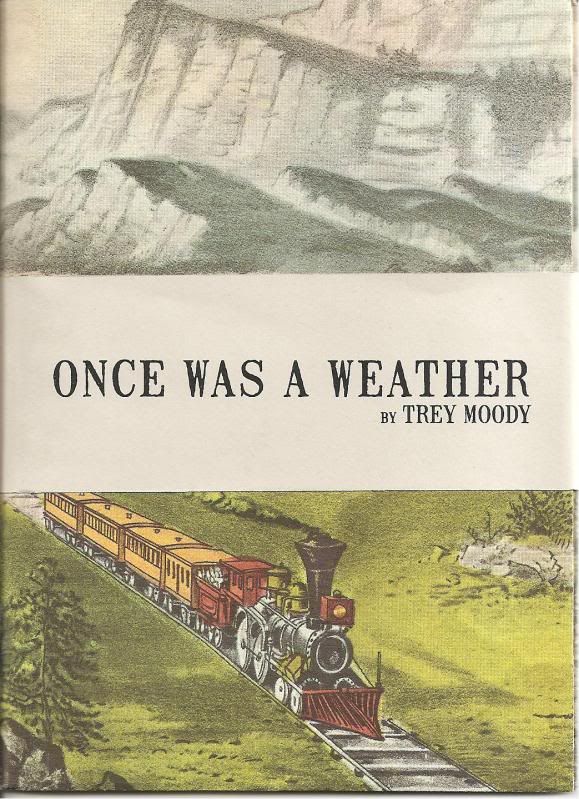
Trey Moody's chapbook Once Was A Weather (Greying Ghost Press, 2011) contains a sequence of prose poems, each one titled “A Weather.” We frequently speak about the weather, but rarely do we consider a weather. By preceding the word “weather” with the indefinite article instead of the definite article, Moody challenges us to consider language's minutia and its effects upon the reader; in many ways, such an engagement echoes Louis Zukofsky's belief that the poet must give “some of his life to the use of the words the and a: both of which are weighted with as much epos and historical destiny as one man can perhaps resolve” (Prepositions 10).
Such an attention to article usage, between the definite and indefinite, signals a highly attuned relationship with language: word combinations are not chosen in a slapdash manner, but “weighed” with the most exacting precision. In the below video, Moody reads a poem from his “A Weather” sequence for the Route 7 Reading Series at Dixie State College in St. George, Utah on 12 April 2012:
Zukofsky's resonance can be heard at the poem's outset, when Moody asks “Why a,” thus confirming his interest in article usage and a willful, Deleuzian “stutter” between “every position of a or the” that constitutes “a zone of vibration” (Essays 109) Of course, to not consider such linguistic matters, at least for the poet, eventuates failure; Moody makes this clear when he says: “Why weather becomes a lack—language suffers, like you.” While this sentence can be interpreted in several ways, we can read it to mean that “Weather,” when stripped of both indefinite and definite article (i.e. an “a” lack, or a “the” lack for that matter) suffers because it refuses to enter a vibratory zone; thus, its “Music wanes.”
Here's Moody reading another selection from his “A Weather” sequence for the Neon Lit Reading Series in Las Vegas, Nevada on 13 April 2012:
Indeed, these prose poems are “Complex countertops” that frustrate the reader if their access point is meaning, or “Information's information.” But the “lack of insight” is only lack if readers attempt to enter the poem, primarily through the meaning-door; if a reader, like the “Wind,” simply “listens,” then access to these poems becomes much easier.
To further extend the relationship between Zukofsky's poetics and Moody's “A Weather” sequence, consider the following excerpt from Charles Bernstein's introduction to Prepositions +; to his mind, sonic elements:
Such an attention to article usage, between the definite and indefinite, signals a highly attuned relationship with language: word combinations are not chosen in a slapdash manner, but “weighed” with the most exacting precision. In the below video, Moody reads a poem from his “A Weather” sequence for the Route 7 Reading Series at Dixie State College in St. George, Utah on 12 April 2012:
Zukofsky's resonance can be heard at the poem's outset, when Moody asks “Why a,” thus confirming his interest in article usage and a willful, Deleuzian “stutter” between “every position of a or the” that constitutes “a zone of vibration” (Essays 109) Of course, to not consider such linguistic matters, at least for the poet, eventuates failure; Moody makes this clear when he says: “Why weather becomes a lack—language suffers, like you.” While this sentence can be interpreted in several ways, we can read it to mean that “Weather,” when stripped of both indefinite and definite article (i.e. an “a” lack, or a “the” lack for that matter) suffers because it refuses to enter a vibratory zone; thus, its “Music wanes.”
Here's Moody reading another selection from his “A Weather” sequence for the Neon Lit Reading Series in Las Vegas, Nevada on 13 April 2012:
Indeed, these prose poems are “Complex countertops” that frustrate the reader if their access point is meaning, or “Information's information.” But the “lack of insight” is only lack if readers attempt to enter the poem, primarily through the meaning-door; if a reader, like the “Wind,” simply “listens,” then access to these poems becomes much easier.
To further extend the relationship between Zukofsky's poetics and Moody's “A Weather” sequence, consider the following excerpt from Charles Bernstein's introduction to Prepositions +; to his mind, sonic elements:
Do not accompany meaning, neither are they arbitrary nor conventionally associated with meaning: they make meaning. When words are heard as sound, the poetic mode of expression has taken hold. The result is…an acoustically charge poetry…derived from the newly invented. (ix-x)Yes, sound in both Zukfosky and Moody create meaning and thus produce an “acoustically charged poetry” emitting an atmospheric music ready to be absorbed by the reader.

No comments:
Post a Comment